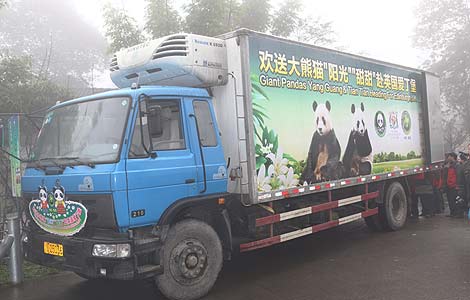Sitting on a gold mine
Updated: 2011-12-07 10:41
By Wang Kaihao, Zhang Yue and Wang Qian (China Daily)
|
|||||||||
 |
|
Clockwise from top left: |

Jiangjia village is a model of prosperity, but residents realize there will be a day when the mines that made them rich are spent. Wang Kaihao, Zhang Yue and Wang Qian report.
There was once an idyllic place called Peach Blossom Valley, according to legend, where everyone was happy, well educated and prosperous. Shandong province's Jiangjia village is a very real modern-day Peach Blossom Valley, owing to the rich gold reserves it sits on. A road sign announcing "No 1 Gold Village in China" greets visitors to Jiangjia, which is about 40 km from the Bohai Sea and a mountainous 40-minute drive from Zhaoyuan city. Residents own the village's gold mining company, Chunyu Corporation Ltd. In 2010, its income was 1.7 billion yuan ($262.8 million). The 300-hectare village has a population of just 300 people, after 500 former residents moved to Zhaoyuan in 2006, when Jiangjia government launched a relocation project to improve residents' living conditions.
Lin Cuiqin, 43, married a Jiangjia villager in 1999 and moved into their new city home in 2006.
| ||||
Like everyone else, they were offered a fully furnished apartment of 140 square meters in Zhaoyuan. They paid just 50,000 yuan ($7,730).
Lin now works as a gardener in her community; and her husband drives to work at Jiangjia village's mine.
Village authorities say about 90 percent of adult villagers work in the mine.
Lin and her husband earn nearly 5,000 yuan a month. They have two daughters, one of whom studies in the village's elementary school, while her elder sister studies in Japan, which costs 80,000 yuan a year.
"We cannot afford these fees on our monthly income," Lin says. "But the village gives each of us 15,000 yuan as a bonus at the end of the year, which is a big help."
Jiangjia was not always so idyllic. For a long time, no one knew it was sitting on a goldmine.
Wang Shuxiang, 65, Lin's mother-in-law, was born in the village and says that in the 1960s, a 0.13-hectare corn field was the major source of income for her family of four. When people living in rural areas were allowed to work in towns in the late 1970s, many locals left.
"Everyone wanted to leave and look for jobs. Just seven or eight people stayed in my neighborhood," Wang recalls.
Gold prospectors from other provinces started appearing in the village in the 1980s, and the mountain soon became a collection of privately owned mines.
"They brought nothing but a hammer to look for gold in our backyard," Wang jokes.
Some villagers worked for the mine owners, while others tried to open their own mines, though this was often too expensive for them.
Wang's older sister worked in a mine workshop for a decade, milling the ore. Sometimes, all she got in terms of a daily salary was sweet potatoes.
The local government shut down Jiangjia's small quarries in 2000, citing safety concerns, after which the village chief founded a corporation to take over the mining industry.
Most of the villagers have given up growing apples and corn since the gold mine boomed. But now they are beginning to think again.
"The mine will become exhausted eventually, and we must think about how our descendents are going to survive then," 46-year-old village official Lu Yijun says.
In response, the village began a huge project to level some hills and create 200 hectares of farmland in 2008.
Additionally, there are plans to make Jiangjia a tourist spot. Blueprints of an ambitious resort are displayed in the village's two-story office.
The project is set to cost 2.2 billion yuan ($347 million), and 300 million has already been spent, Lu says.
Few villages can afford such a big project, Lu proudly adds.
Just a few hundred meters away from the office, another resort, with a handful of villas, are also under construction.
"Gold is how the village prospered," Lu says. "Gold brought us from rags to riches in the 1950s."
Currently, more than 80 percent of villagers own cars - some more than one. A new road connecting the village to Zhaoyuan is being built as traffic jams are common.
However, due to decades of isolation, mainly caused by poor transportation, many villagers such as Lin Cuiqin are poorly educated.
"When we were asked about the village's future development, I found myself unable to write my thoughts down," Lin says.
The village authority has taken steps to remedy this situation by inviting college professors to give lectures.
This year, 40 high school graduates went to college. The village has produced 180 college graduates in the past 10 years.
"We encourage them to come back after graduation," Lu says. "The village provides at least 50,000 yuan to help them start a business here."
Young bachelors in Jiangjia typically seek out partners with a higher education. "This is how we can become better in the long run," village official Lu says.













